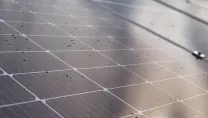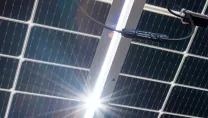Glass-glass solar panels have become popular in recent years. They are an innovative and reliable option for producing solar energy.
Designers create these panels with tempered glass on both the front and back, which distinguishes them from the more common glass-foil solar panels. More people are choosing glass-glass solar panels. Solar energy is becoming popular. These panels help meet long-term energy needs.
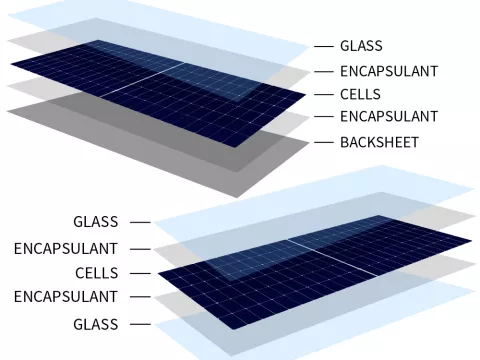
This article will look at the main benefits of solar double glass panels. We will compare them to traditional glass-foil panels. We will also show how glass-glass technology is a smart choice for homes and businesses using solar energy.
Key Benefits of Glass-Glass Solar PV modules
Durability and Lifespan
One of the most notable advantages of glass-glass solar panels is their exceptional durability. Tempered glass on both sides makes these panels strong against environmental damage. Glass-glass solar modules can withstand strong winds, and extreme heat. They remain strong and safe in tough weather.
This high level of durability leads to an extended lifespan. Solar glass-glass panels are durable. This durability can be immensely helpful for investors and homeowners. They can expect good returns on their investments.
Resistance to challenging environments and temperatures
Another critical benefit of double glass solar panels is their superior performance in humid and wet environments. The double layer of glass provides better protection against moisture.
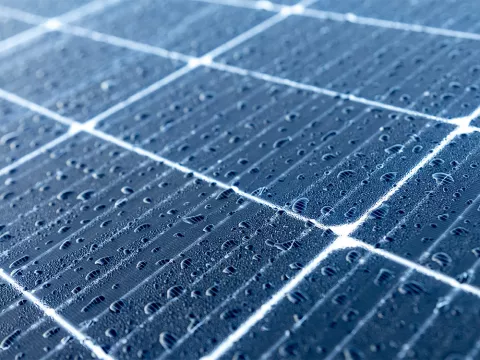
Moisture can cause rust and other damage to PV panels over time if the cells are not adequately protected. In areas with high humidity, frequent rain, or near the coast, glass-glass panels can work better. They might be less affected by the environment. This extra resistance to moisture helps the system work well for many years, even in adverse conditions.
Moreover, the glass-glass structure enhances the overall safety of the panels. Dual glass solar panels are safer against fire than glass-foil models.
The glass on both sides protects the panel from heat and fire. This feature is crucial for places that experience extreme heat, or where fire safety rules are strict. Using glass-glass panels gives property owners greater confidence in the safety and reliability of their solar energy systems.
Energy Efficiency
Bifacial glass-glass solar panels are durable, safe, and can be more energy-efficient in specific conditions. The dual glass layers provide greater light absorption, which can lead to enhanced efficiency, particularly in diffuse lighting conditions.
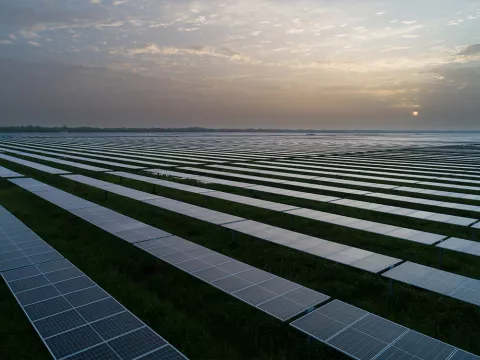
On cloudy days or in shaded areas, double glass solar panels have a good performance. They capture light more effectively and convert it into energy more efficiently than glass-foil panels. This added efficiency translates into higher energy yields, even when environmental conditions are not ideal.
Glass-Glass vs Glass-Foil Solar Panels: A Comparison
Now that we have discussed the benefits of glass-glass solar panels, we should compare them to glass-foil panels. This will help us understand which option is best for different needs.
One of the most significant differences between glass-glass and glass-foil panels is the level of durability. Conventional solar glass-foil panels typically consist of a single glass layer on the front and a foil backing on the rear. While this design makes the panels lighter and easier to install, it might make them more vulnerable to damage.
The foil layer can warp, dent, or corrode over time. This can happen if the foil quality is poor, or the supplier does not install it correctly. This is especially true in areas with high humidity, sea salt, or extreme weather. In contrast, glass-glass panels offer increased resistance to such wear and tear, leading to a longer operational lifespan.
Many people see glass-glass solar panels as heavier and less favorable than glass-foil panels. The double-glass design is heavier. This means it needs stronger mounting systems.
It can also make installation a bit more complicated. Consider this during planning, especially for roof installations that might require extra support.
Glass-glass solar panels usually cost more to buy at first, because of the more expensive materials. However, the longer lifespan of glass-glass panels often balances this initial investment.
Another critical difference is energy performance under various lighting conditions. Glass-glass solar panels are great at capturing diffuse sunlight. This makes them more efficient on cloudy days or in shaded areas.
Below is a summary of the two technologies:
| Aspect | Glass-Glass Panels | Glass-Foil Panels |
| Durability | High resistance to wear and tear, longer lifespan | More vulnerable to damage, especially in harsh conditions |
| Weight | Heavier, requires stronger mounting systems | Lighter, easier to install |
| Installation | More complicated, may need extra support for roofs | Easier and quicker to install |
| Lifespan | Longer operational lifespan | Shorter lifespan |
| Energy Performance | Better in diffuse sunlight, efficient on cloudy days | Less effective in diffuse light conditions |
Choosing the Right Solar Panel
Glass-glass solar panels are strong and can withstand different weather conditions. This makes them a good option for long-term solar investments. Their resistance to environmental factors and enhanced safety features offers peace of mind for many consumers.
Lighter and cheaper glass foil panels attract people who want easy installation and lower initial costs. Considering your environment and budget will help you find the best option for your solar energy goals.
To learn more about our glass solar panels and how they can benefit your project, visit our website, and contact our sales team. They will provide tailored solutions to help you find the best solar option to meet your energy goals.


